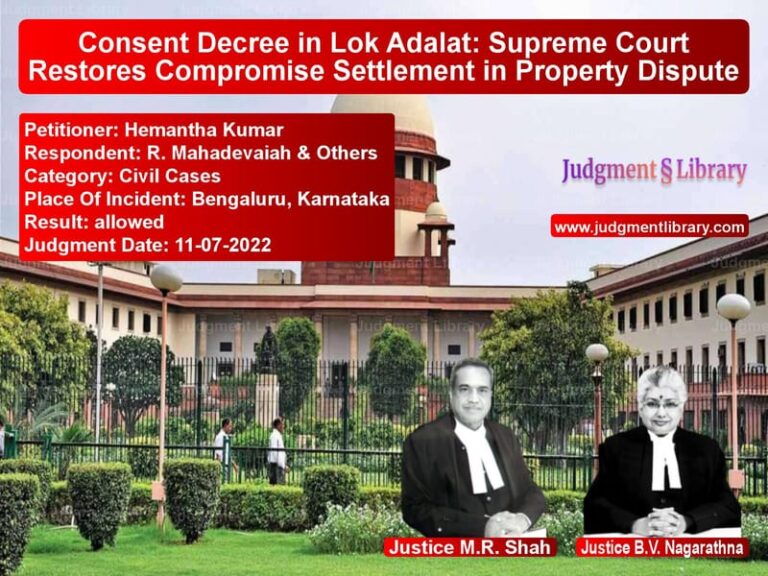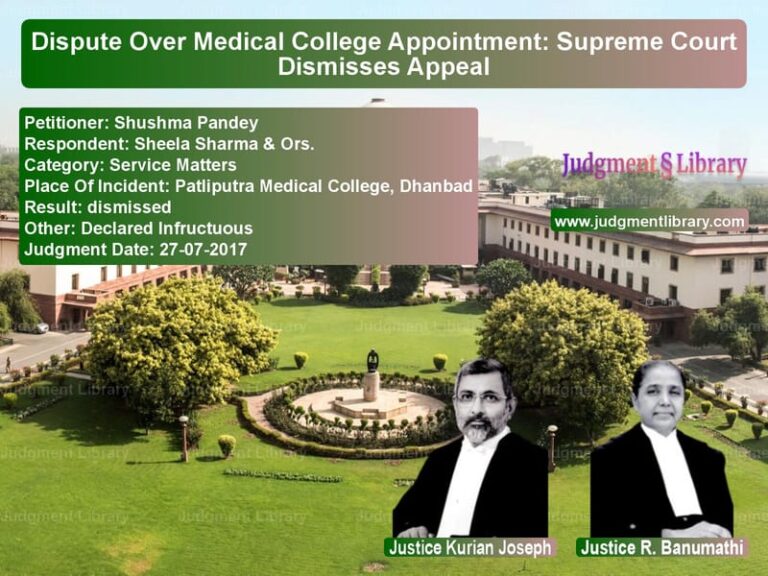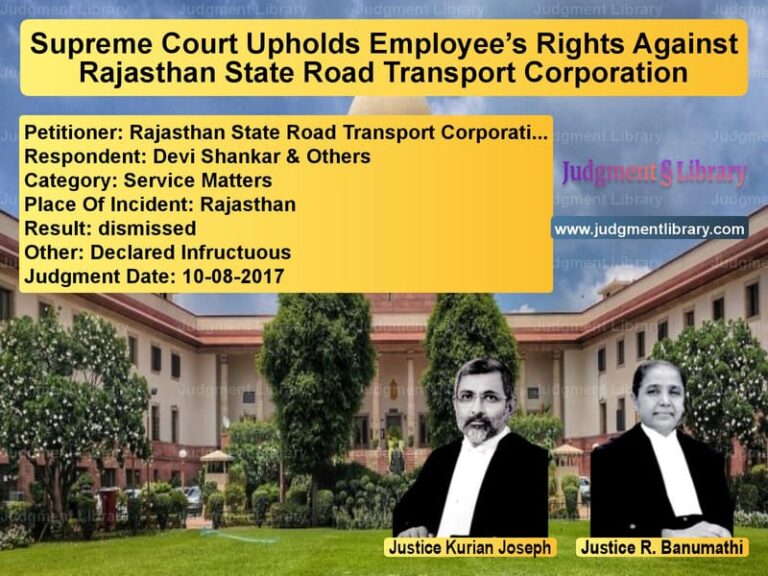Supreme Court Upholds Maintenance for Wife: Landmark Judgment on Domestic Violence Act
The case of Shalu Ojha vs. Prashant Ojha is a significant ruling concerning maintenance under the Protection of Women from Domestic Violence Act, 2005 (DV Act). The Supreme Court was asked to decide whether the maintenance amount granted by the lower courts should be reduced or upheld, given the financial conditions of both parties.
Background of the Case
The petitioner, Shalu Ojha, filed an application under Section 12 of the DV Act seeking maintenance from her husband, Prashant Ojha. Their marriage, which took place on April 20, 2007, lasted only four months before they separated. The dispute centered around the monthly maintenance amount awarded by the Metropolitan Magistrate, which was later modified by the Additional Sessions Judge (ASJ) and challenged in the High Court.
Legal Issues Raised
1. Determination of Maintenance Amount
Should the maintenance granted by the lower courts be upheld, reduced, or increased?
2. Financial Capacity of the Husband
What was the actual financial capacity of the husband, and should his alleged financial difficulties impact the maintenance award?
3. Right of the Wife to a Decent Standard of Living
Should the wife’s maintenance amount be reduced if she has some savings, or does she have the right to a decent standard of living?
Arguments by the Parties
Arguments by the Petitioner (Shalu Ojha)
- She has no independent source of income and is fully dependent on the maintenance provided by her husband.
- Her husband, Prashant Ojha, owns multiple businesses and has a high monthly income, as evidenced by documents provided in court.
- The reduction of maintenance by the ASJ from Rs. 2,50,000 to Rs. 50,000 per month was arbitrary and should be overturned.
Arguments by the Respondent (Prashant Ojha)
- He is facing severe financial difficulties and cannot afford to pay Rs. 2,50,000 per month.
- The petitioner has savings and fixed deposits amounting to Rs. 44 lakhs, which indicate she has additional financial resources.
- His business ventures have failed, and he no longer has any stable income sources.
Supreme Court’s Observations
1. No Grounds to Reduce Maintenance Below Rs. 50,000
The Supreme Court upheld the Rs. 50,000 monthly maintenance amount, stating:
“In a matter arising under a legislation meant for protecting the rights of the women, the courts should be slow in reducing maintenance awarded to a deserted wife.”
2. No Clear Evidence of Husband’s Financial Hardship
The Court noted that the husband’s claim of financial hardship was not sufficiently proven:
“The respondent has failed to produce conclusive evidence that his financial condition has deteriorated to such an extent that he cannot even pay Rs. 50,000 per month.”
3. Wife’s Savings Not a Justification to Reduce Maintenance
The Supreme Court rejected the argument that the wife’s savings should impact her maintenance, stating:
“The existence of savings does not mean that the wife does not require maintenance. The amount saved over time is not an income but a reflection of frugality.”
4. Continuation of Rs. 50,000 Maintenance Order
The Court ordered that until further orders by a competent court, the husband must continue to pay Rs. 50,000 per month.
Final Judgment
The Supreme Court ruled as follows:
- The maintenance amount of Rs. 50,000 per month is upheld.
- The husband’s plea for further reduction is rejected.
- The petitioner is given the liberty to file for maintenance under the Hindu Adoptions and Maintenance Act, 1956 or Section 125 of the Criminal Procedure Code, 1973 to seek further enhancement.
- The execution of maintenance orders must be completed within 8 weeks.
Implications of the Judgment
This ruling has significant implications for maintenance disputes under the DV Act:
- Protects Women’s Financial Rights: Ensures that wives are not left without support.
- Sets a Precedent for Fair Maintenance Orders: Prevents arbitrary reductions in maintenance amounts.
- Balances Judicial Review: Encourages courts to consider all financial evidence before modifying maintenance orders.
- Clarifies the Role of Savings: Establishes that a wife’s savings should not automatically reduce her maintenance.
Conclusion
The case of Shalu Ojha vs. Prashant Ojha reaffirms the Supreme Court’s commitment to protecting the financial rights of women under the DV Act. By upholding the maintenance order and rejecting arbitrary reductions, the Court has reinforced the principle that a wife is entitled to a reasonable standard of living post-separation. This ruling sets a critical precedent for future maintenance disputes in India.
Petitioner Name: Shalu Ojha.Respondent Name: Prashant Ojha.Judgment By: Justice A.K. Sikri, Justice Ashok Bhushan.Place Of Incident: Delhi, India.Judgment Date: 23-07-2018.
Don’t miss out on the full details! Download the complete judgment in PDF format below and gain valuable insights instantly!
Download Judgment: Shalu Ojha vs Prashant Ojha Supreme Court of India Judgment Dated 23-07-2018.pdf
Direct Downlaod Judgment: Direct downlaod this Judgment
See all petitions in Alimony and Maintenance
See all petitions in Domestic Violence
See all petitions in Property Division in Divorce Cases
See all petitions in Judgment by A.K. Sikri
See all petitions in Judgment by Ashok Bhushan
See all petitions in allowed
See all petitions in supreme court of India judgments July 2018
See all petitions in 2018 judgments
See all posts in Divorce Cases Category
See all allowed petitions in Divorce Cases Category
See all Dismissed petitions in Divorce Cases Category
See all partially allowed petitions in Divorce Cases Category







